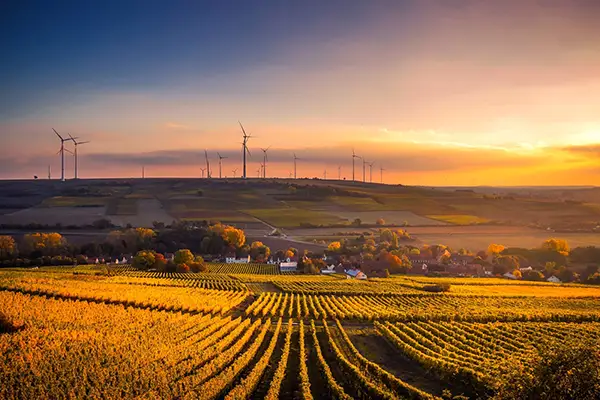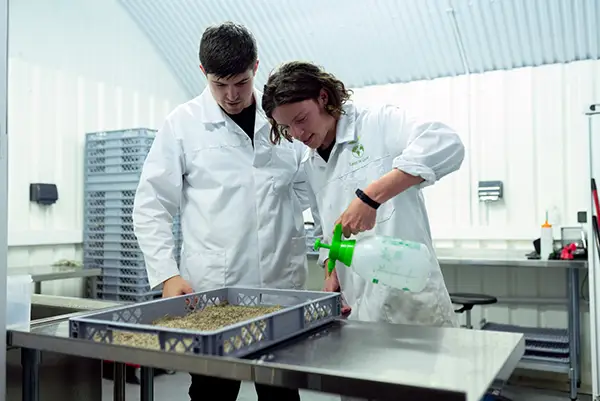Best Agricultural Job Opportunities: Making a Sustainable Difference Down Under

Introduction:
Sustainable agriculture is gaining significant attention and recognition in Australia as a crucial approach towards securing a sustainable future. In the face of environmental challenges and the need to ensure food security, sustainable farming practices have become imperative. This article explores Australia’s diverse array of sustainable agriculture jobs and highlights the growing demand for professionals in this field. Additionally, it delves into the educational pathways and training options available for individuals interested in pursuing careers that positively impact the environment. By examining the innovations, challenges, and potential solutions in sustainable agriculture, this article emphasises the need to embrace and promote environmentally conscious farming practices for a better and more sustainable future.
The Importance of Sustainable Agriculture in Australia
Understanding Sustainable Agriculture
Sustainable agriculture is like the cool older cousin of traditional farming. It’s all about finding ways to produce food while preserving the planet for future generations. Think of it as a way to satisfy our cravings for avocados without Mother Earth giving us the cold shoulder.
The Significance of Sustainable Agriculture in Australia
With its vast landscapes and unique ecosystems, Australia relies heavily on agriculture to feed its people and export delicious goodies. But with climate change and other environmental challenges, it’s become clear that we need a more sustainable approach to farming. Sustainable agriculture is not just a trendy buzzword here; it’s necessary to ensure food security and protect our natural resources. Plus, who wants to avoid munching on a carrot grown in harmony with nature?
The Growing Demand for Sustainable Agriculture Jobs
Increasing Awareness and Concern for Environmental Sustainability
Do you know that feeling when you find out that your favourite ice cream brand harms cute pandas? That’s how people are starting to feel about unsustainable farming practices. There’s a growing awareness and concern for environmental sustainability, and consumers want to support farms caring for the planet. This means there’s a demand for professionals to help farmers transition to more sustainable practices.
Government Initiatives and Support for Sustainable Agriculture
The government is more than just sitting around eating Vegemite sandwiches and BBQing shrimp. They’re taking sustainable agriculture seriously. With various initiatives and support programs in place, they’re encouraging farmers to adopt sustainable practices and providing funding for research and development. So, if you’re looking for a career in sustainable agriculture, you’ll find plenty of opportunities with the backing of the big wigs.
Rising Consumer Demand for Sustainable Food
Let’s face it: we all want to feel like heroes when grocery shopping. And one way to do that is by choosing sustainably sourced food. Consumers are becoming more conscious of their food choices’ impact on the planet, and they’re willing to pay extra for organic, locally grown, and ethically produced goods. So, if you dream about a job that lets you save the environment while earning a living, sustainable agriculture is the perfect fit.
Careers in Sustainable Farming: A Wide Range of Opportunities
If you’re looking to break into the sustainable farming industry, you’ll be pleased to know that many career paths are available to you. From agricultural engineering to farm management to nearly every profession in between, there are many opportunities in agriculture. The agricultural industry has come a long way in the past few decades, which means more jobs are available than ever before. Whether you’re just starting or a seasoned pro, there’s plenty of room at the table in sustainable farming. So why grab a pitchfork and join in on the fun?
Organic Farming and Permaculture
Organic farming and permaculture are two innovative practices changing the agriculture industry. Natural methods such as crop rotation, composting, and intercropping preserve the soil’s health while producing bountiful yields. Plus, they allow farmers to work in harmony with the environment rather than against it. Not only is organic farming economically and environmentally sustainable, but it also produces healthier and more nutrient-rich food. Permaculture takes it one step further by focusing on the design of self-sufficient ecosystems that require little human interference. It’s incredible to see how these practices benefit farmers and consumers alike, promoting a healthier and more sustainable future for our planet.
Sustainable Crop Production
Sustainable crop production is all about balancing the needs of farmers, consumers, and the environment. It’s not just about growing food; it’s about doing so in a way that preserves the land for future generations. Day-to-day operations include everything from soil management to pest control, and each decision made is critical to ensuring a successful harvest. But sustainable crop production is only some work and no play! It’s an exciting field, with new technologies emerging constantly and a focus on innovation. By embracing sustainable practices, farmers are protecting the earth and creating healthier, tastier crops. So, the next time you take a bite of a juicy apple or crunch into a fresh carrot, remember that sustainable crop production played a vital role in bringing that delicious food to your plate!
Regenerative Livestock Management
Regenerative Livestock Management is an innovative approach to agriculture that focuses on improving the health of the land, people, and animals. It’s a system that considers the ecosystem’s natural cycles and processes while also involving farm managers’ creative thinking. It’s a joy to see farmers implementing regenerative practices have flourishing crops, healthy livestock, and improved soil conditions. With the help of regenerative livestock management, farmers are finding ways to make their operations more sustainable and efficient. It’s the best of both worlds, where eco-friendly farming practices can be fun and profitable.
Agroforestry and Agroecology
Agroforestry and agroecology are two growing fields that are gaining popularity among those interested in sustainable farming and land management. As more and more people become aware of the impact that conventional farming practices can have on the environment, these two approaches are emerging as potential solutions. What’s even better is that pursuing a bachelor’s degree in either of these fields can be both informative and fun. As students delve into concepts like intercropping, silvopasture, and regenerative agriculture, they’ll see firsthand how these practices can positively impact the environment. Plus, they’ll be able to apply what they’ve learned to their farms or gardens, creating a sustainable, eco-friendly future for all..
Education and Training for Sustainable Agriculture Jobs
Are you interested in a sustainable agriculture job? Look no further than agricultural recruitment! Education and training are crucial in preparing for a career in sustainable agriculture, and there’s no better way to get started than by working with a recruitment agency that specialises in this field. With their guidance, you can learn about the latest practices and technologies that make sustainable agriculture more efficient and effective. Whether you’re interested in working on a farm, in a research lab, or another related area, agricultural recruitment can help you find the right position and get the training you need to succeed. So why start exploring your options today? The future of sustainable agriculture is waiting for you!
University and College Programs
Are you interested in sustainability and agriculture? Well, you’re in luck because the future of sustainable agriculture is booming! Not only is this industry ethical and meaningful, but it can also lead to some of the highest-paying jobs. Many universities and colleges nationwide are catching on and now offering programs specifically tailored to education and training for sustainable agriculture jobs. Such programs can lead to various positions, such as farm management, food safety inspection, and sustainable energy implementation. If you’re passionate about agriculture and sustainability, consider pursuing a program in this field to jumpstart your career towards a fulfilling and rewarding path.
Vocational Training and Certifications
Looking for a career change that lets you grow with the roots of the world? Vocational training and certification programs are the best way to dive into sustainable agricultural jobs. With the increasing demand for locally grown and eco-conscious produce, the future of agriculture is more than just planting and harvesting. Vocational programs offer a unique hands-on experience across various fields, such as organic farming, agricultural engineering, nutrient management, and animal husbandry. These programs also provide opportunities for certifications that further demonstrate your skills and knowledge of sustainable farming practices. Join the movement towards a greener future and learn how to sow the seeds of innovation through vocational training and certifications in agriculture.
Internships and Apprenticeships
Sometimes, the best way to learn is by doing, and internships and apprenticeships offer just that. These opportunities allow you to get your hands dirty (quite literally) and learn from experienced professionals in the field. Not only will you gain valuable knowledge, but you’ll also make connections that can open doors for future job opportunities. It’s like getting paid to learn and grow—what’s not to love?
Innovations and Technologies Driving Sustainable Agriculture in Australia
Australia is making significant strides in sustainable agriculture through innovative technologies. Two key advancements driving this progress are precision agriculture and smart farming. Precision agriculture uses data and sensors to monitor and manage crops precisely, making farming operations more efficient and reducing waste. Smart farming takes precision agriculture further by integrating digital technologies, such as drones and robotics, to automate tasks and optimise farming practices.
Another innovative approach gaining momentum is vertical farming and controlled environment agriculture. These methods allow for the cultivation of crops in vertically stacked layers or enclosed environments with controlled temperature, humidity, and lighting. Vertical farming maximises land usage and reduces the need for pesticides and water, making it an environmentally friendly solution.
Biotechnology and genetic engineering also play a significant role in sustainable agriculture. Scientists are developing genetically modified organisms (GMOs) resistant to pests, diseases, and extreme weather conditions. By creating crops with enhanced traits, farmers can reduce the use of chemical inputs, minimise crop losses, and increase yields.
Challenges and Solutions in the Field of Sustainable Agriculture
While sustainable agriculture offers immense benefits, it also comes with its fair share of challenges. One major concern is managing water resources effectively. Australia is a dry continent, and water scarcity is a pressing issue. Sustainable agriculture practices, such as drip irrigation, water-efficient technologies, and water recycling systems, are crucial for conserving water and ensuring its efficient usage in agriculture.
Climate change poses another significant challenge for sustainable agriculture. Changing weather patterns, extreme temperatures, and increased frequency of droughts and floods can impact crop productivity. Farmers are adopting adaptation strategies like crop diversification, developing heat-tolerant crop varieties, and implementing climate-smart agricultural practices to mitigate the effects of climate change.
Maintaining soil health and conservation is vital for sustainable agriculture. Soil erosion, degradation, and declining fertility threaten long-term food production. Practices like cover cropping, no-till farming, and rotational grazing help prevent erosion, retain nutrients, and improve soil structure, resulting in more productive and sustainable agricultural systems.
Promoting Environmental Stewardship through Sustainable Farming Practices
Sustainable farming practices play a crucial role in promoting environmental stewardship. Conservation tillage and crop rotation minimise soil disturbance, enhance soil health, and reduce erosion. Farmers can protect soil structure, reduce nutrient runoff, and improve water retention by leaving crop residues on the field and rotating different crops.
Integrated pest management (IPM) is another key approach to sustainable agriculture. Instead of relying solely on chemical pesticides, IPM emphasises using a combination of biological control, cultural practices, and targeted pesticide applications. This method reduces the impact on beneficial organisms, minimises pesticide residues, and promotes natural pest control mechanisms.
Managing biodiversity and ecosystem services is essential for sustainable agriculture. Farmers are encouraged to create habitats for beneficial insects, birds, and other wildlife to enhance biodiversity. These organisms contribute to natural pest control, pollination, and nutrient cycling, improving farm productivity and resilience.
Embracing Sustainable Agriculture for a Better Future
Sustainable agriculture is the path to a better future, ensuring food security, environmental preservation, and economic prosperity. Australia has been at the forefront of embracing sustainable practices and technologies, and the future looks promising.
Individuals and communities have a significant role to play in promoting sustainability. By supporting local farmers who practice sustainable agriculture, consumers can drive demand for environmentally friendly produce. Being mindful of food waste, conserving water, and adopting sustainable lifestyle choices are simple yet impactful ways individuals can contribute to a more sustainable agricultural system.
Sustainable agriculture becomes even more critical as we continue to face global challenges like climate change and dwindling natural resources. By embracing innovative technologies, addressing challenges, and promoting environmental stewardship, we can create a brighter and more sustainable future for agriculture in Australia. So, let’s dig in and sow the seeds of change together!
Conclusion:
As we conclude this exploration of sustainable agriculture jobs in Australia, it is evident that adopting eco-friendly farming practices is essential and promising. With increasing awareness and demand for sustainable food production, there is a growing emphasis on developing innovative technologies and implementing effective strategies to overcome the challenges in this field. By embracing sustainable agriculture, we can contribute to environmental stewardship, enhance food security, and foster a more sustainable future for future generations. Through the collective efforts of individuals, communities, and policymakers, we can truly make a difference in transforming Australia’s agricultural landscape into one that is sustainable, resilient, and environmentally conscious.

FAQ
Ans: Sustainable agriculture is a term that has been buzzing around for some time now. As a farm manager, it’s essential to understand the importance of sustainable agriculture. It’s a system where farm animals are raised in a way that doesn’t harm the environment, and the use of harmful chemicals is minimized. Not only this, but sustainable agriculture also means being mindful of the energy used by the farm machinery and the overall carbon footprint. Fun fact: Did you know that sustainable agriculture practices can positively impact the surrounding ecosystem? It encourages biodiversity, which means more birds, bugs, and critters, helping maintain a healthy balance. In short, sustainable agriculture means a healthy farm, a healthy environment, and a healthier you!
Ans: Sustainable agriculture offers an exciting and rapidly growing field for job seekers. If a sustainability career appeals to you, you might be interested in exploring the various career opportunities. From agricultural economists to environmental engineers, there is plenty of roles that need to be filled in this industry. However, one of sustainable agriculture’s biggest challenges is keeping up with industry trends. This is where you could come in, providing fresh ideas and innovative solutions to ensure the growth and success of sustainable agriculture. If you want to be a part of a movement that is working towards a healthier planet and a more sustainable future, then exploring career opportunities in sustainable agriculture might be the perfect fit.
Ans: Several education and training pathways are available for individuals interested in pursuing careers in sustainable agriculture. Universities and colleges offer degree programs in sustainable agriculture, agroecology, and related fields. Vocational training institutes provide certifications in organic farming, permaculture design, and sustainable land management. Internships and apprenticeships also provide valuable hands-on experience in sustainable farming practices.
Autobiography
Eric Reyes is a passionate thought leader, having been featured on 50 distinguished online and offline platforms. His passion and knowledge in finance and business made him a sought-after contributor who provided valuable insights to his readers. You can find him reading a book and discussing current events in his spare time.
Follow Us
Latest Post















